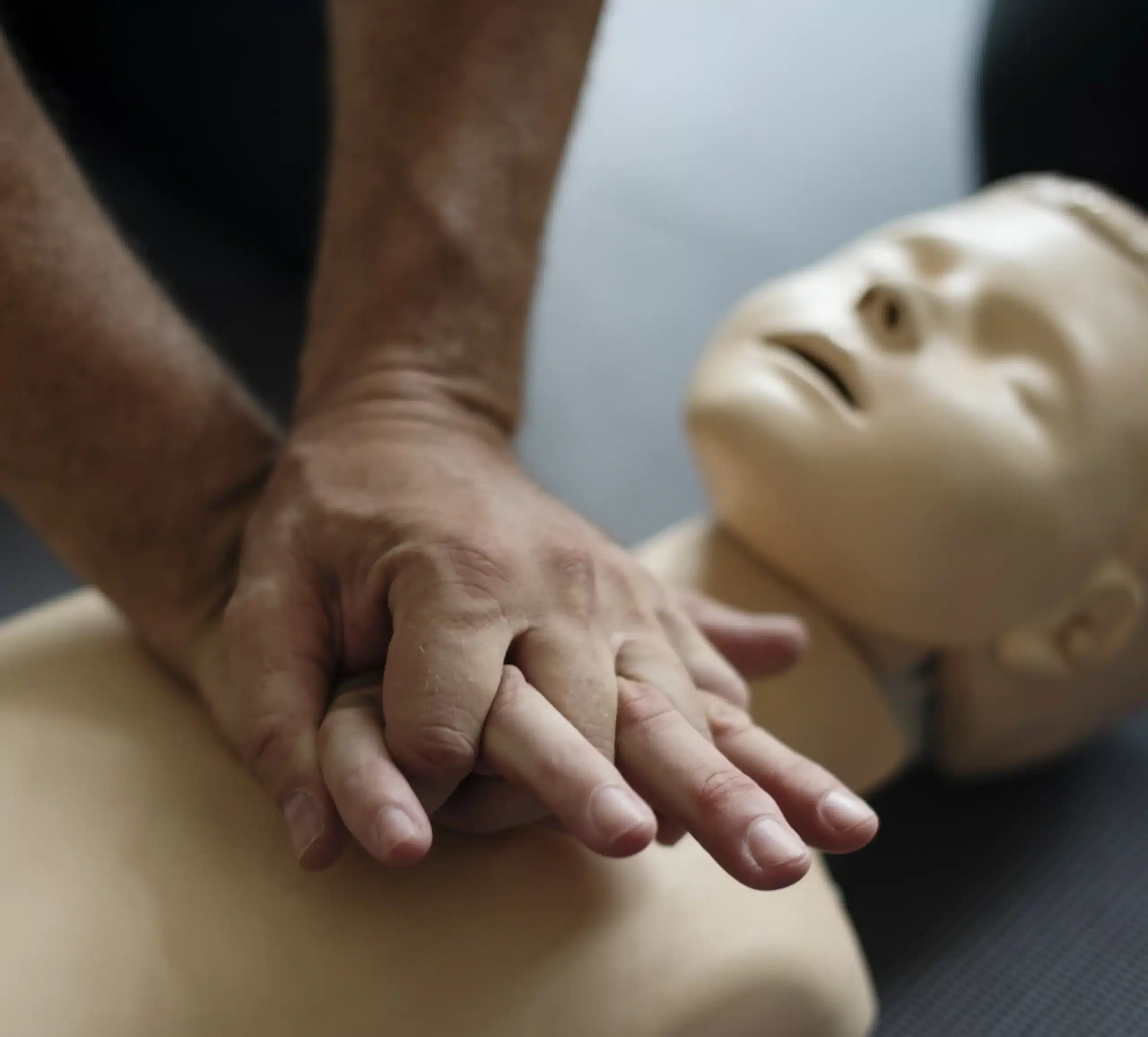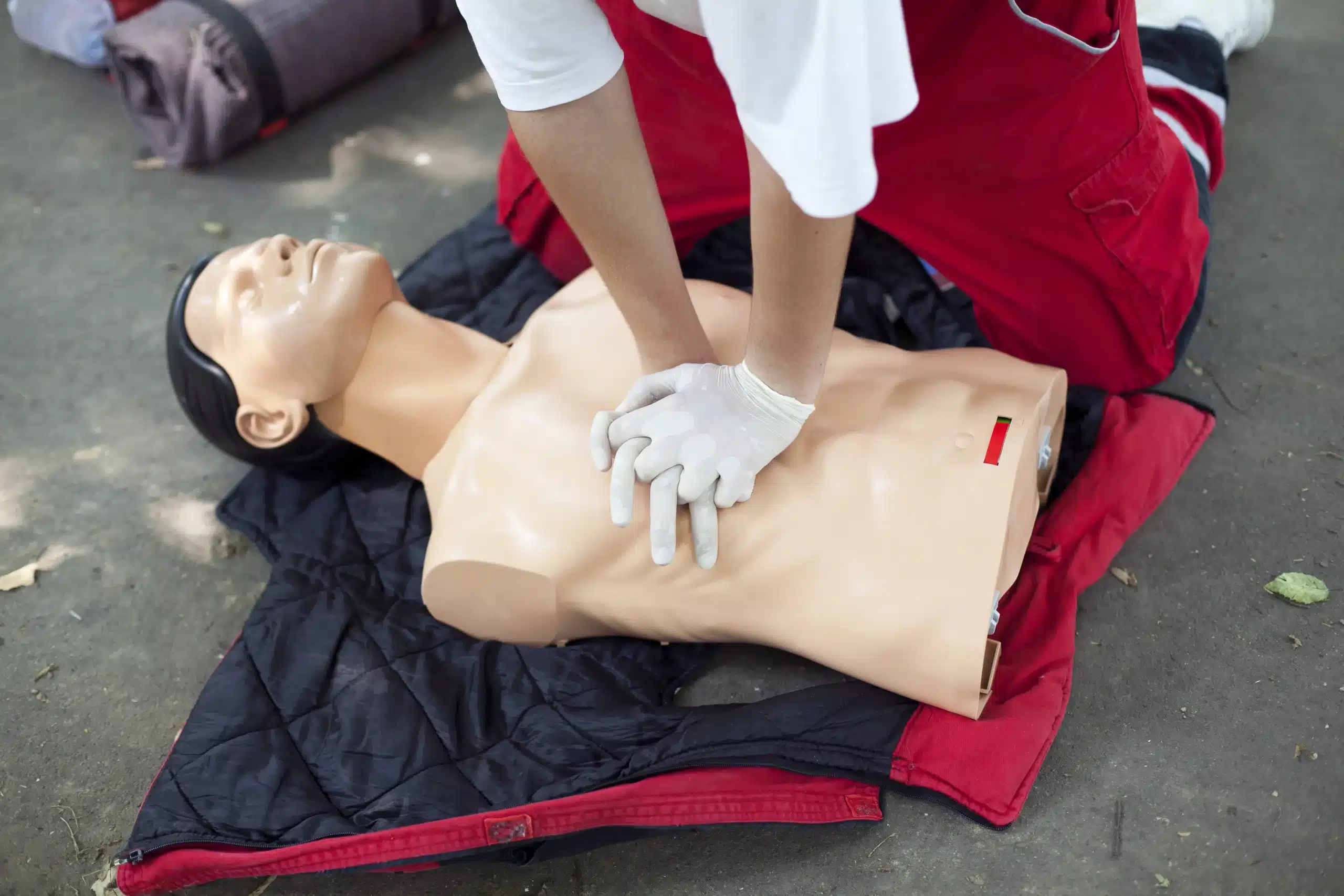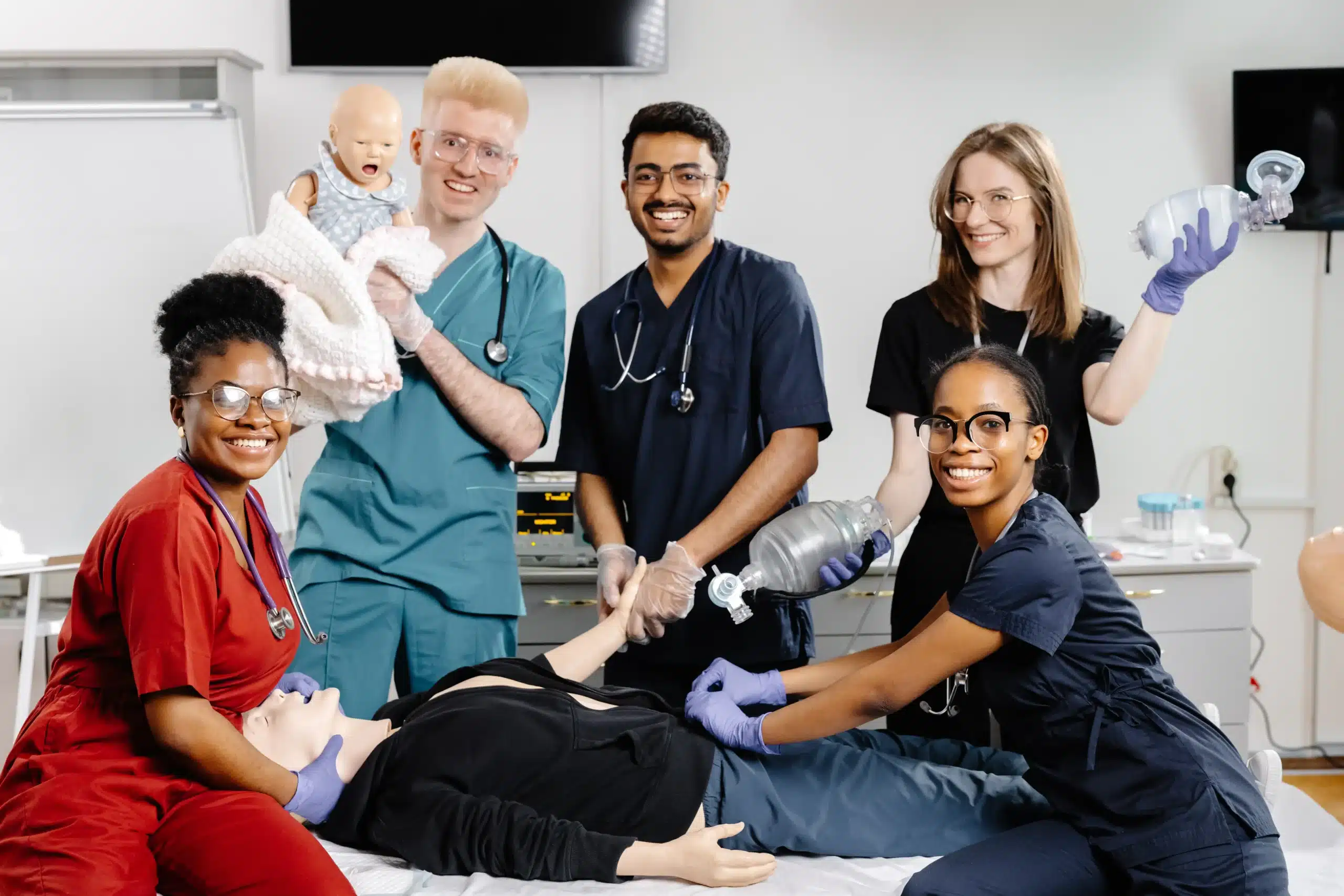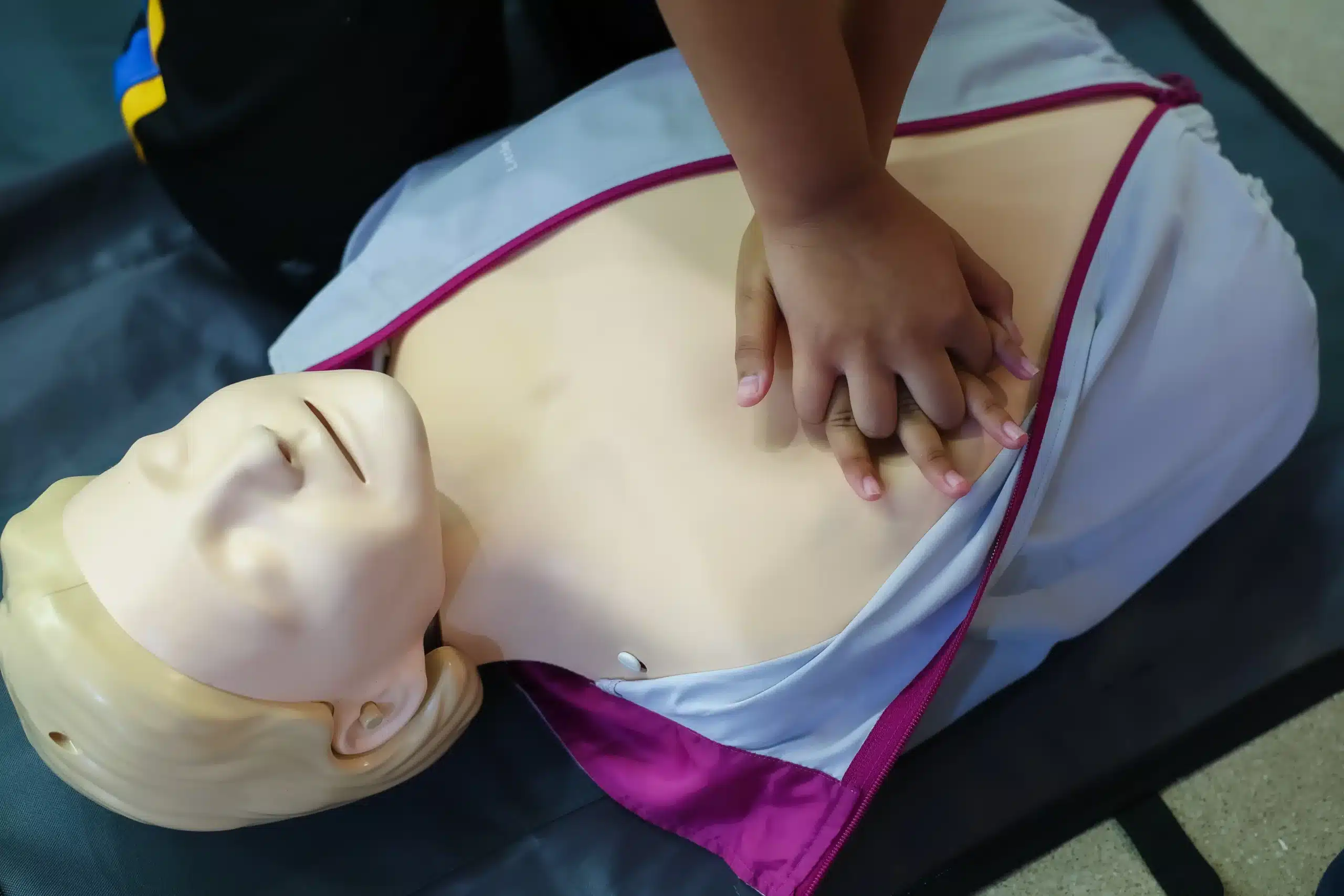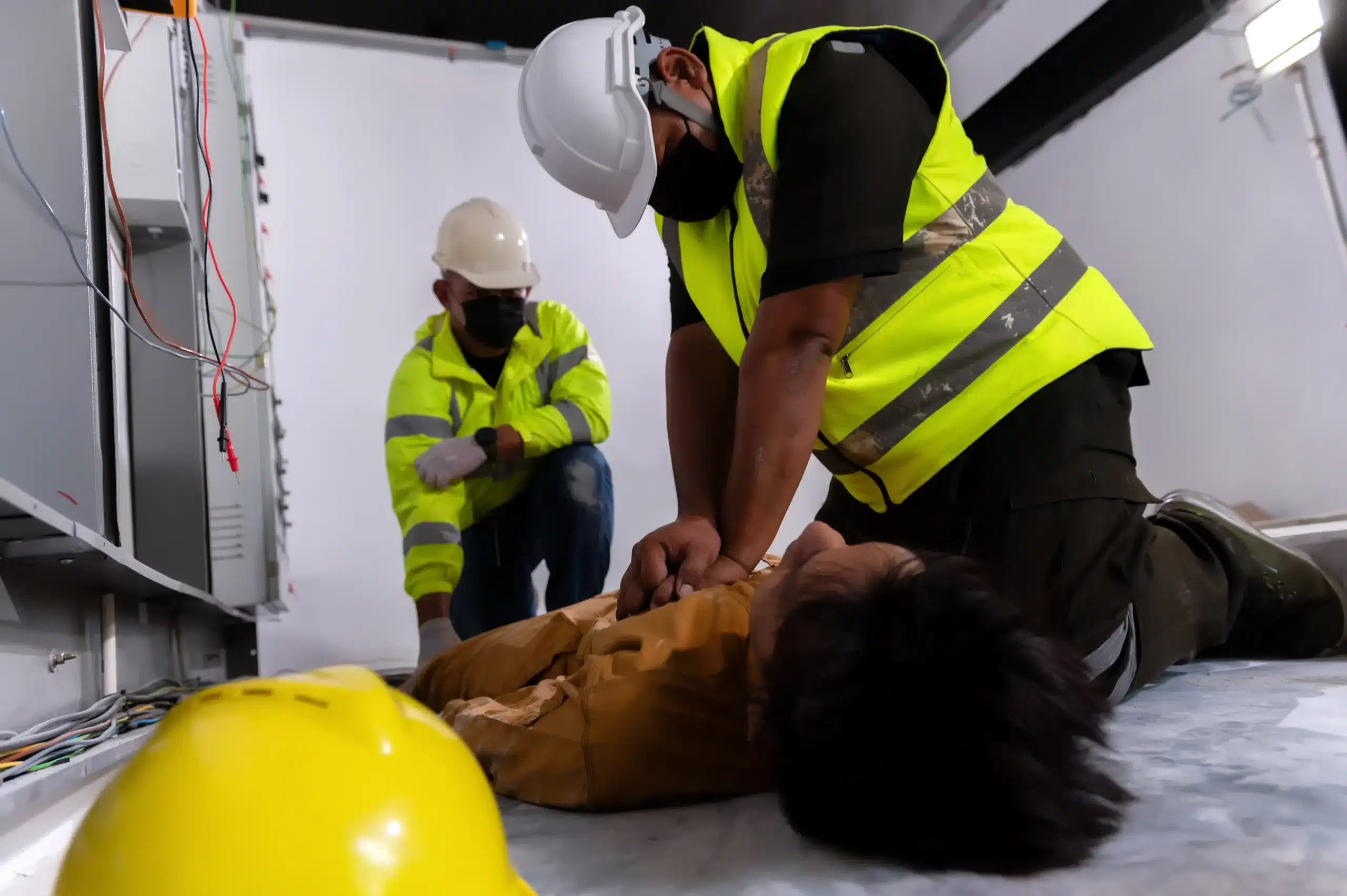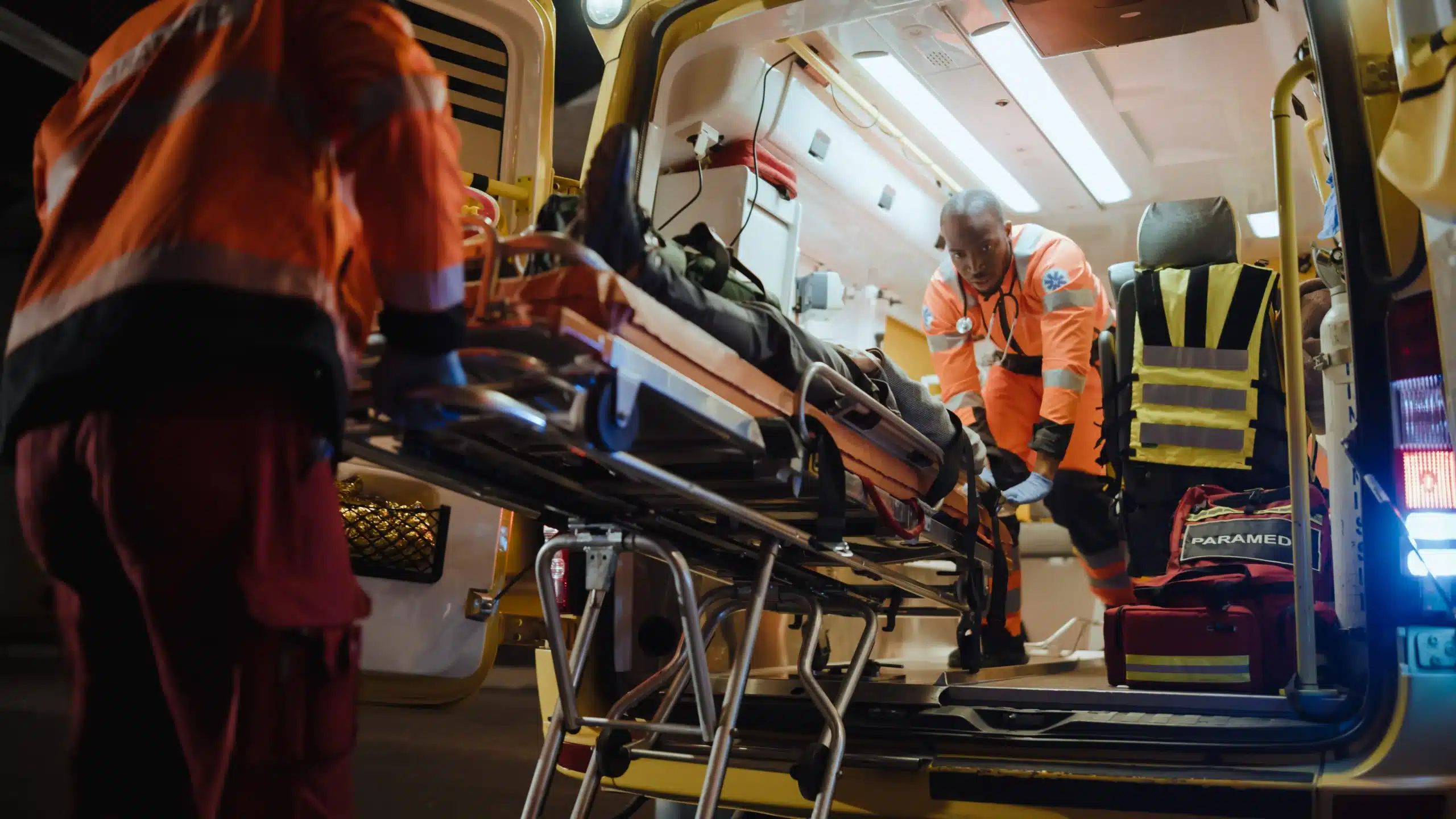Emergencies can happen anytime, anywhere. Would you know what to do if someone near you suddenly collapsed? CPR training in Tulare equips you with the life-saving skills to respond confidently and effectively in such critical situations. This guide breaks down the essentials of CPR training, from understanding the different certification levels (like BLS, ACLS, and PALS) to finding convenient and affordable courses in your area. We’ll also discuss the importance of instructor qualifications, the renewal process, and the specific benefits CPR training offers to various professions, including healthcare, education, and fitness. Let’s explore how CPR training in Tulare can empower you to make a real difference.
Key Takeaways
- Find the right CPR training for your needs: Whether you’re a healthcare professional, childcare provider, or simply want to be prepared, various CPR certifications, from basic to advanced, can equip you with life-saving skills. Consider your individual needs and career path when choosing a course.
- Select a quality training program: Look for AHA-certified instructors with relevant experience. Think about factors like course format (online, in-person, or blended), class size, and convenient locations like Visalia for Tulare and Delano residents. Ask about pricing and guarantees.
- Stay current with your CPR skills: Renew your certification every two years and refresh your knowledge regularly through practice and continuing education. This ensures you’re always prepared to respond confidently and effectively in an emergency.
What is CPR Training in Tulare?
CPR training in Tulare gives people the skills to handle medical emergencies. Courses cover essential techniques like chest compressions, rescue breaths, and how to use an AED. These skills are important for everyone, from healthcare professionals and first responders to everyday community members. CPR training goes beyond just technical skills; it builds confidence so you can act quickly and effectively in emergencies. Several organizations in Tulare offer comprehensive CPR training, including Safety Training Seminars serving Visalia, Tulare, and Delano. They offer a variety of American Heart Association courses, including BLS, ACLS, PALS, and First Aid. For additional local CPR course information, check out Tulare CPR Classes. Whether you’re a medical professional, work in childcare, or simply want to be prepared, CPR training in Tulare provides valuable, potentially life-saving skills.
CPR Certification Courses Available
Choosing the right CPR certification course depends on your specific needs and career path. Here’s a breakdown of common CPR certifications available in Tulare:
Basic Life Support (BLS)
BLS certification is the foundation for anyone who might need to respond to a cardiac arrest or choking emergency. This course teaches essential life-saving skills, including CPR, how to use an AED (automated external defibrillator), and relief of choking. BLS certification is often a prerequisite for other advanced certifications and is vital for healthcare providers, first responders, and anyone working with children. It’s also a smart choice for those who want to be prepared for emergencies at home or in their community. Safety Training Seminars offers BLS certification courses in Visalia.
Advanced Cardiovascular Life Support (ACLS)
ACLS certification is designed for healthcare professionals who manage cardiopulmonary arrest and other cardiovascular emergencies. Building upon the fundamentals of BLS, ACLS training delves into advanced airway management, pharmacology, and team dynamics during resuscitation. This certification is crucial for doctors, nurses, paramedics, and other healthcare providers who work in critical care settings. Check out the ACLS courses available through Safety Training Seminars.
Pediatric Advanced Life Support (PALS)
PALS certification focuses on the specialized needs of infants and children facing respiratory or cardiovascular emergencies. This course equips healthcare providers with the skills to assess, treat, and stabilize pediatric patients in critical situations. Like ACLS, PALS certification builds on the foundation of BLS and is essential for pediatricians, pediatric nurses, emergency medical technicians, and other healthcare professionals working with children. Safety Training Seminars also provides PALS training in Visalia.
First Aid Certification
While not strictly CPR, First Aid certification is a valuable complement to any CPR training. First Aid courses teach you how to respond to a wide range of medical emergencies, from minor cuts and burns to more serious injuries like fractures and allergic reactions. Learning basic first aid can help you provide immediate care until professional medical help arrives. You can often find First Aid training offered alongside CPR courses. Consider adding First Aid certification to your skillset.
CPR Course Formats and Structure
Understanding the different CPR course formats and structures available can help you choose the best fit for your schedule and learning style. Let’s break down the typical options.
Hybrid Learning: Online & In-Person Skills
Many CPR training centers now offer hybrid courses, blending online learning with essential in-person skills sessions. This format offers flexibility for busy professionals and those with demanding schedules. You’ll typically complete the cognitive portion of the course online at your own pace, covering topics like CPR steps, recognizing emergencies, and providing first aid. Then, you’ll attend an in-person skills session to practice techniques on manikins and receive feedback from certified instructors. This blended approach ensures you grasp both the theory and practical application of CPR. Safety Training Seminars, for example, offers similar hybrid courses in nearby Visalia, combining online convenience with hands-on practice.
Hands-On Practice with Manikins
Regardless of the course format you choose, hands-on practice is crucial for mastering CPR skills. Courses typically involve practicing chest compressions, rescue breaths, and using an AED (Automated External Defibrillator) on realistic manikins. This tactile experience builds your muscle memory and confidence, preparing you to respond effectively in a real emergency. The practice sessions allow instructors to provide personalized feedback, ensuring you’re using proper techniques and depth of compressions.
Course Duration & Time Commitment
The time commitment for CPR training varies depending on the course level and specific provider. Basic CPR courses for the general public usually take around three hours. Professional-level CPR for healthcare providers typically requires four to five hours. More advanced courses, such as BLS, ACLS, and PALS, can take up to 16 hours and may be spread over multiple days to allow for in-depth learning and skills practice. When choosing a CPR course, consider the time commitment and select an option that aligns with your availability.
CPR Training Costs
CPR training costs vary depending on the course type, format, and training provider. Understanding the pricing structure will help you budget effectively and find the best value for your certification. Safety Training Seminars is committed to offering the lowest prices in Tulare County, backed by our Low Price Guarantee.
Individual Course Rates
Individual course rates typically differ based on the level of certification you’re pursuing. For example, Basic Life Support (BLS) certification often has a lower cost than more advanced courses like Advanced Cardiovascular Life Support (ACLS) or Pediatric Advanced Life Support (PALS). Contact us for the most up-to-date pricing on individual BLS courses in Visalia. We’re happy to answer any questions and guide you to the right course.
Group Discounts & Promotions
If you’re training a group, like your staff or a community organization, ask about group discounts. Many training centers, including Safety Training Seminars, offer reduced rates for group bookings. This can significantly lower the cost when certifying multiple people. Contact us for more information on current group discounts and promotions. We can help you find the most cost-effective solution for your organization’s training needs.
Low Price Guarantee
Safety Training Seminars offers a Low Price Guarantee, ensuring you receive high-quality training at a competitive price. We believe cost shouldn’t prevent anyone from learning these essential lifesaving skills. If you find a lower advertised price for the same course in Tulare County, we’ll match it. Our commitment to affordable training makes us a top choice for CPR certification in Visalia.
Instructor Qualifications
Choosing the right CPR training course is a big decision, and the instructor’s qualifications play a vital role in your learning experience. You want to make sure you’re learning from knowledgeable and experienced professionals. Here’s what to look for in a CPR instructor:
AHA Certification
A key qualification to look for is American Heart Association (AHA) certification. AHA-certified instructors undergo rigorous training and stay updated on the latest CPR guidelines and techniques. This ensures they provide high-quality training that meets national standards. Safety Training Seminars instructors hold these certifications, giving you confidence in the quality of instruction you’ll receive. AHA certification signifies a commitment to excellence and adherence to the most current, evidence-based practices.
Healthcare & Emergency Response Experience
While formal certification is essential, real-world experience adds another layer of valuable insight. Many CPR instructors have backgrounds in healthcare and emergency response. This experience allows them to share practical knowledge and answer your questions based on real-life scenarios. Look for programs, like those offered at Safety Training Seminars, that emphasize this practical approach, bridging the gap between textbook knowledge and real-world application. This hands-on perspective can make a significant difference in your confidence and ability to respond effectively in an emergency.
Enroll in CPR Training
Now that you understand the importance of CPR certification and the various courses available, let’s discuss how to actually enroll in a class. Finding the right course and signing up is easier than you might think!
How to Sign Up
Many CPR training providers offer online registration, making it convenient to find a class that fits your schedule. For example, Safety Training Seminars in Visalia allows you to browse BLS courses and register online. Look for providers who offer a variety of course dates and times, including weekend and evening options, to accommodate busy schedules. Don’t hesitate to contact the training center if you have questions or prefer to register by phone. They are there to help guide you through the process.
Required Materials & Age Requirements
Most CPR courses require minimal materials. Typically, the training provider will supply everything you need, including the manikin for practice. However, it’s always a good idea to confirm this with the provider before your class. As for age requirements, most CPR courses are open to anyone aged 16 and older. Some providers may offer specific courses for younger audiences, so if you’re looking for training for a teenager, inquire about age-appropriate options. You can usually find more information about specific requirements on the provider’s website or by contacting them directly. Safety Training Seminars offers a low price guarantee, so you can be confident you’re getting a good value.
Top Tulare CPR Training Providers
Finding the right CPR training provider is crucial for a quality learning experience. Here are some of the top CPR training providers in the Tulare area:
Safety Training Seminars in Visalia
Safety Training Seminars in Visalia offers a comprehensive range of American Heart Association (AHA) courses, including BLS, ACLS, PALS, CPR, and First Aid. They also provide courses like NRP and EMSA Health & Safety training for childcare providers. With daily classes and two-year certifications, they prioritize convenience and thorough training. They are committed to excellent customer service and offer a Low Price Guarantee for their courses, ensuring the best value in Tulare County. Contact them to learn more or check their BLS course schedule for upcoming classes.
Tulare CPR
Tulare CPR specializes in AHA certifications and recertifications. They offer a variety of courses, including BLS, CPR, ACLS, PALS, and First Aid. They also offer Bleeding Control training. For added flexibility, they utilize the AHA’s HeartCode eLearning system, allowing students to complete the online portion of their training before scheduling an in-person skills evaluation.
College of the Sequoias
The College of the Sequoias provides BLS CPR classes that lead to AHA certification. These classes are offered at three convenient locations: Visalia, Hanford, and Tulare. This makes their training accessible to a wider range of students and working professionals. Visit the College of the Sequoias website for more information.
Central Valley CPR
Central Valley CPR is known for delivering high-quality CPR training in the Tulare area. They offer various courses, including BLS and First Aid, taught by certified instructors. You can find more information and reviews on their Yelp page.
American Red Cross (Serving Tulare Area)
The American Red Cross offers various CPR and first-aid certification courses designed for healthcare providers and the general public. Known for their focus on convenient and high-quality training, they prepare participants to handle emergencies effectively. Find a class near you on the American Red Cross website. You can also find reviews and more information on their Yelp page.
Benefits of CPR Certification
Knowing CPR can empower you to make a real difference in a critical situation. Whether you work with children, are a healthcare professional, or simply want to be prepared for anything, CPR certification offers a range of benefits. Let’s explore how this valuable skill can be advantageous across various professions.
Healthcare Professionals
For healthcare providers like doctors, nurses, EMTs, and paramedics, CPR certification is often a job requirement and equips you with the skills to respond effectively during cardiac arrests and other medical emergencies. Regularly refreshing these skills through programs like RQI classes ensures you stay up-to-date with the latest American Heart Association guidelines and maintain the highest standard of patient care. This proficiency can significantly improve patient outcomes.
Childcare Providers & Educators
Working with children carries a unique responsibility. As a childcare provider, educator, or even a parent, having CPR certification provides peace of mind and the ability to respond swiftly if a child experiences a breathing emergency or cardiac event. Knowing how to perform CPR on infants and children can be truly life-saving. Safety Training Seminars offers courses designed for childcare providers, covering the nuances of CPR for younger age groups.
Fitness Instructors & Coaches
Fitness instructors and coaches often guide individuals through strenuous physical activities, sometimes increasing the risk of sudden cardiac events or breathing difficulties. CPR certification allows fitness professionals to respond immediately if a participant experiences a medical emergency. This rapid response can be crucial in stabilizing the individual until professional medical help arrives.
Agricultural & Industrial Workers
Agricultural and industrial settings often involve heavy machinery, physically demanding tasks, and remote locations, which can increase the risk of workplace accidents. CPR training empowers workers in these fields to provide immediate assistance to injured colleagues, potentially minimizing the severity of injuries, especially when access to immediate medical care might be delayed. Contact Safety Training Seminars to learn about specialized training options.
Maintain Your CPR Certification
Keeping your CPR skills sharp is as important as getting certified in the first place. In emergency situations, seconds count, and having up-to-date knowledge and training can make all the difference.
Renewal Process & Frequency
CPR certifications are generally valid for two years. However, it’s essential to check specific requirements, as some employers or licensing boards may require more frequent renewal. Staying informed about these timelines ensures you meet all necessary standards and maintain your qualifications. You can find helpful information about CPR certification validity from resources like Verywell Health. While your certification card might be valid for two years, regular practice is key for confident and effective performance. Refreshing your skills every 6–12 months is highly recommended. This consistent practice bridges the gap between certification and practical application, ensuring you can respond effectively under pressure. MedTrainer offers further insights into CPR training.
Continuing Education Options
Beyond renewing your basic certification, consider exploring continuing education to expand your skillset. These options can provide advanced training and specialized knowledge in areas like advanced cardiovascular life support (ACLS) or pediatric advanced life support (PALS). Tulare CPR Classes offers a range of courses, including blended learning options that combine online coursework with hands-on skills practice. This approach allows for flexible learning while still providing the crucial hands-on experience needed for effective CPR performance. Many organizations, like LifeStar Ambulance, prioritize ongoing education for their employees through continued education classes and simulations. This commitment to ongoing training highlights the importance of staying current with the latest techniques and best practices in emergency response. By actively pursuing continuing education, you not only enhance your own capabilities but also contribute to a higher standard of care.
Choose the Right CPR Training
Finding the right CPR training program is crucial for effective learning and preparedness. Whether you’re a healthcare professional, educator, or concerned citizen in Tulare, understanding your needs and the available options will help you make the best choice.
Factors to Consider
Think about what you want from your training experience. Do you prefer a blended approach with online learning and in-person skills sessions? This hybrid model is popular, offering flexibility for busy schedules. Consider also the course format and how it fits your learning style. Some people thrive in a traditional classroom setting, while others prefer the self-paced nature of online learning. Location is another key factor. Choose a training center that’s conveniently located, like our facility in Visalia, easily accessible to residents of Tulare and Delano. Safety Training Seminars offers a variety of courses to fit your needs.
Questions to Ask Before Enrolling
Before you commit to a CPR class, asking a few key questions can save you time and ensure you get the training you need. First, confirm the program’s accreditation. Ensure the certification you receive is recognized and accepted in your field. American Heart Association (AHA) certification is widely accepted and respected. Next, inquire about the instructor’s qualifications and experience. Experienced instructors can provide valuable insights and guidance. Also, check the class size. Smaller classes often allow for more personalized attention and feedback. Finally, don’t hesitate to ask about the Low Price Guarantee and any available group discounts, especially if you’re enrolling with colleagues or friends. A quick call or visit to our contact page can answer all these questions and help you make an informed decision.
Related Articles
- BLS Certification in Tulare County: Your Complete Guide – Visalia CPR Classes
- CPR Training in Visalia: Your Complete Guide – Visalia CPR Classes
- ACLS Courses in Tulare: Your Certification Guide – Visalia CPR Classes
- CPR Renewal in Visalia: Your Complete Guide – Visalia CPR Classes
- BLS Courses in Tulare: Your Guide to Certification – Visalia CPR Classes
Frequently Asked Questions
How much does CPR training cost in Tulare County?
CPR training costs vary based on the type of course and the training provider. Basic CPR classes are generally less expensive than advanced certifications like ACLS or PALS. Safety Training Seminars offers a Low Price Guarantee, ensuring you get the most affordable rates in Tulare County. Check their website or contact them directly for specific pricing.
What’s the difference between BLS and CPR certification?
BLS (Basic Life Support) certification is a broader term that encompasses CPR (Cardiopulmonary Resuscitation) but also includes other essential life-saving skills like using an AED and relieving choking. Think of CPR as one component within the broader scope of BLS.
How long is a CPR certification valid?
CPR certifications are typically valid for two years. However, it’s always a good idea to check with your employer or licensing board, as they may have specific renewal requirements. Even if your certification is technically valid, refreshing your skills every six to twelve months is recommended to maintain proficiency.
What if I have a busy schedule? Are there flexible CPR training options?
Yes, many CPR training centers offer flexible options to accommodate busy schedules. Look for hybrid courses that blend online learning with in-person skills sessions. This allows you to complete the coursework at your own pace and then attend a shorter in-person session for hands-on practice. Also, check for weekend or evening classes.
How do I choose the right CPR training provider?
Consider a few key factors: Look for providers offering AHA-certified courses, as these meet nationally recognized standards. Check the instructor’s experience and qualifications. Think about class size – smaller classes often offer more personalized instruction. Finally, consider location and convenience. Choose a training center that’s easy to get to and offers courses that fit your schedule.
